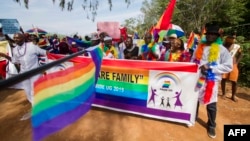The biggest problem facing the LGBT community in Uganda is not anti-gay laws, but rather homophobic public altitude against same sex relations, which local politicians are using to vilify gay people, a human rights lawyer said Tuesday.
Nicholas Opiyo of the human rights group Chapter Four Uganda said while anti-gay groups in Uganda could not have carried out the Orlando, Florida gay nightclub shooting, still gay people in Uganda cannot openly express themselves.
Opiyo told VOA while most Ugandans are horrified by the Orlando, Florida massacre, anti-gay government officials are using such violence to justify the ill-treatment of gays in Uganda.
“Not so many people follow cable news to understand the extent of the horror at the Orlando club. But the few people who watch cable news are shocked at the utter brutality of some people in the U.S. And in terms of our leadership, they have used that type of violence to justify violence against our own people here in Uganda,” he said.
Uganda is one of the few African countries, including Nigeria, Mauritania, Somalia and Sudan, where the general public does not accept same sex relations or behavior. In some of these countries homosexuality is even punishable by death.
“While we may not take guns and shoot people the way people in Orlando have done, but here we do not see any possibility of gay people freely expressing themselves, even in private in disco halls, let alone walking in the middle of town holding hands. If that happens, they will be beaten, they will be chased; they would be stoned,” Opiyo said.
Ugandan President Yoweri Museveni signed a draconian Anti-Homosexuality Bill in February 2015. The legislation stipulated repeat offenders should be sentenced to 14 years in prison.
But a constitutional court struck down the law, noting that the parliament speaker acted illegally by going ahead with a vote on the bill despite at least three lawmakers objecting to a lack of quorum.
Late last year, Museveni announced he would no longer pursue further anti-gay legislation in Uganda.
Opiyo said the Ugandan president probably backed down due to intense international criticism, including the United States announcing sanctions against Uganda.
“Well, the president understood the foreign policy implications of enacting a law that targets gay people in Uganda. And I think that the foreign policy implications were suspension of funding from several development partners, more difficult relationship with the U.S. So the international pressure on President Museveni has come to bear on him,” Opiyo said.




